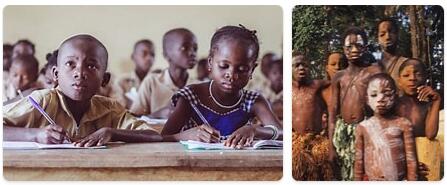Yearbook 2016
Ivory Coast. Domestic politics began the year with Prime Minister Daniel Kablan Duncan submitting a resignation application to his government in January. The current population of Côte d’Ivoire is 26,378,285. President Alassane Ouattara, however, reappointed Duncan, and he formed a new government where most key posts were occupied by the same ministers as in the former.

In June, President Ouattara initiated a process aimed at making changes to the country’s constitution. The opposition opposed, at an early stage, the proposed reforms which would mean, among other things, that the president is given the right to appoint the vice president and that the rule that a presidential candidate’s two parents must be born in the country is removed. Ouattara himself has been surrounded by rumors that he would partly have a foreign background, something the president himself has denied.
In July, the parliament, which is almost entirely dominated by supporters of Ouattara as the opposition boycotted the 2011 election, decided that a referendum on the constitutional issue would be held this fall. At the beginning of October, the constitutional proposals were approved by Parliament and the following day a referendum is announced until October 30. A few days before the election, police dispersed thousands of protesters in the country’s largest city of Abidjan. However, the referendum could be held as planned, but after the opposition called for a boycott, turnout was low, only 42%. Of the voters, 93% supported the changes in the constitution. A few days later, the Constitutional Court in the country announced that the new constitution had been adopted.
In December elections were held for Parliament. Unlike the 2011 election, the Ivorian People’s Front (FPI), a former government party led by then-President Laurent Gbagbo, participated. A major security effort helped to ensure that the elections could be held without an outbreak of violence. 167 of Parliament’s 255 seats went to Ouattara’s Houphouetist Democracy and Peace (RHDP) party, and a total of 76 independent candidates were elected. No other party was given more than six seats and the FPI had to settle for only three. The turnout was low, below 35%.
In March, at least 18 people were shot dead and about 30 injured when Islamist terrorists attacked a beachfront resort in the city of Grand Bassam east of Abidjan. The militant movement of al-Qaeda in the Islamic Maghreb (Aqim), along with al-Mourabitoun, took on the deed, which was said to be mainly aimed at France as revenge for the former colonial power fighting Islamists in the region. The two organizations were also behind a similar attack in Burkina Faso’s capital Ouagadougou in January. At the end of April, it was announced that France would strengthen its military presence in Ivory Coast during the summer.
According to thereligionfaqs, tensions between the Ivory Coast and Burkina Faso arose since the Burkina authorities issued an arrest warrant for Guillaume Soro, president of the Ivory Coast parliament. Soro was accused of being involved in the coup attempt in Burkina Faso in the fall of 2015. In a recording of a conversation between Soro and the Burmese politician Djibril Bassolé, who is close to former president Blaise Compaoré, the two should have expressed their support for a coup attempt before this took place. Alassane Ouattara, in a press release, expressed the view that problems between the two neighboring countries would be resolved with diplomacy. The arrest warrant against Soro was withdrawn in June. An arrest warrant for Compaoré, who was forced to relinquish power in 2014, had previously been issued.
Former President Laurent Gbagbo in January became the first former head of state to be tried at the International Criminal Court (ICC) in The Hague. Gbabgo stated that he considered himself innocent of the charges. Along with his co-accused, former militia leader Charles Blé Goudé, Gbagbo is charged with four cases of crimes against humanity in connection with the violence that erupted after the 2010 presidential election. committed by supporters of Alassane Ouattara during the same period would be intensified. So far, only Gbagbo and his supporters have been prosecuted.